Analyzing My Baseball Career, Now That It's Over
Nate Rasmussen dives into his baseball career from start to finish.
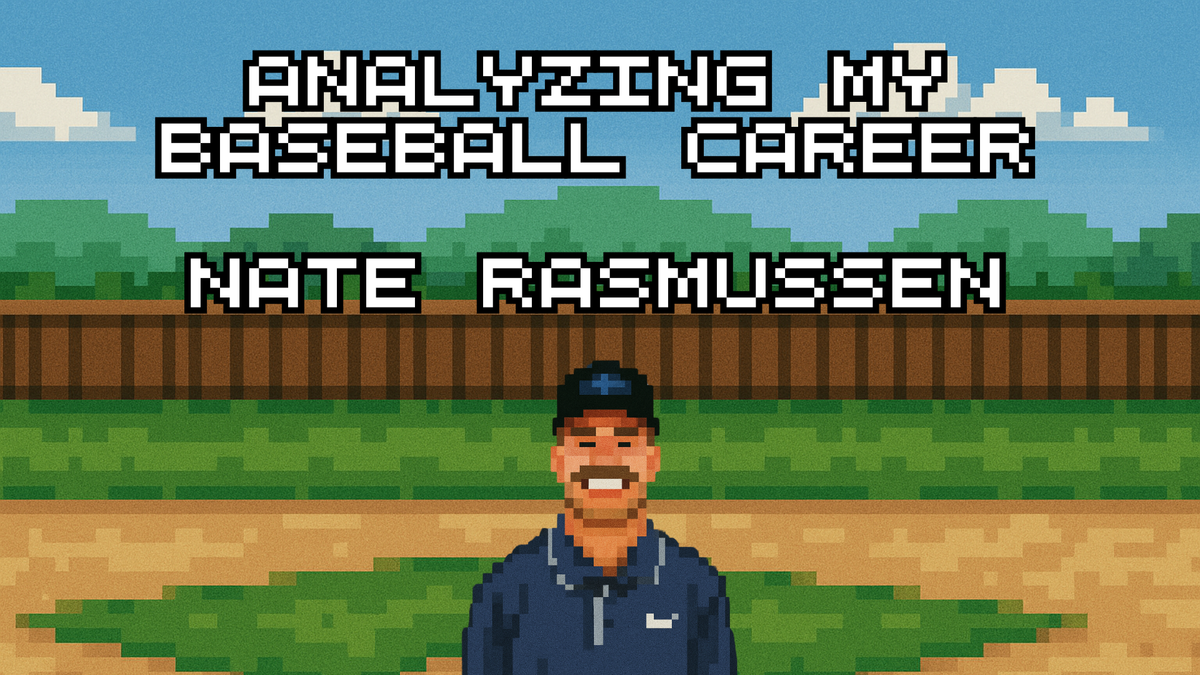
My baseball career ended in May of 2025, so what better time than now to analyze myself as a player? You would think with all this scouting work I could figure myself out, but honestly, I had one of the more interesting baseball careers based on my abilities. Let’s start from the top.
Early Days
I don’t remember much from my youth, let alone playing baseball when I was young. I remember playing with 10-year-olds when I was 7, which in hindsight makes no sense but was probably cool. I played Little League in West Seattle for my whole childhood. My clearest memory of this time was the feeling. Bar-S Playfield in West Seattle is a place that means a lot to me and the surrounding community. When you’re 7, you don’t think about how beautiful the field you play on is, but man, was it beautiful. The parents and volunteers who maintained that place deserve the world.
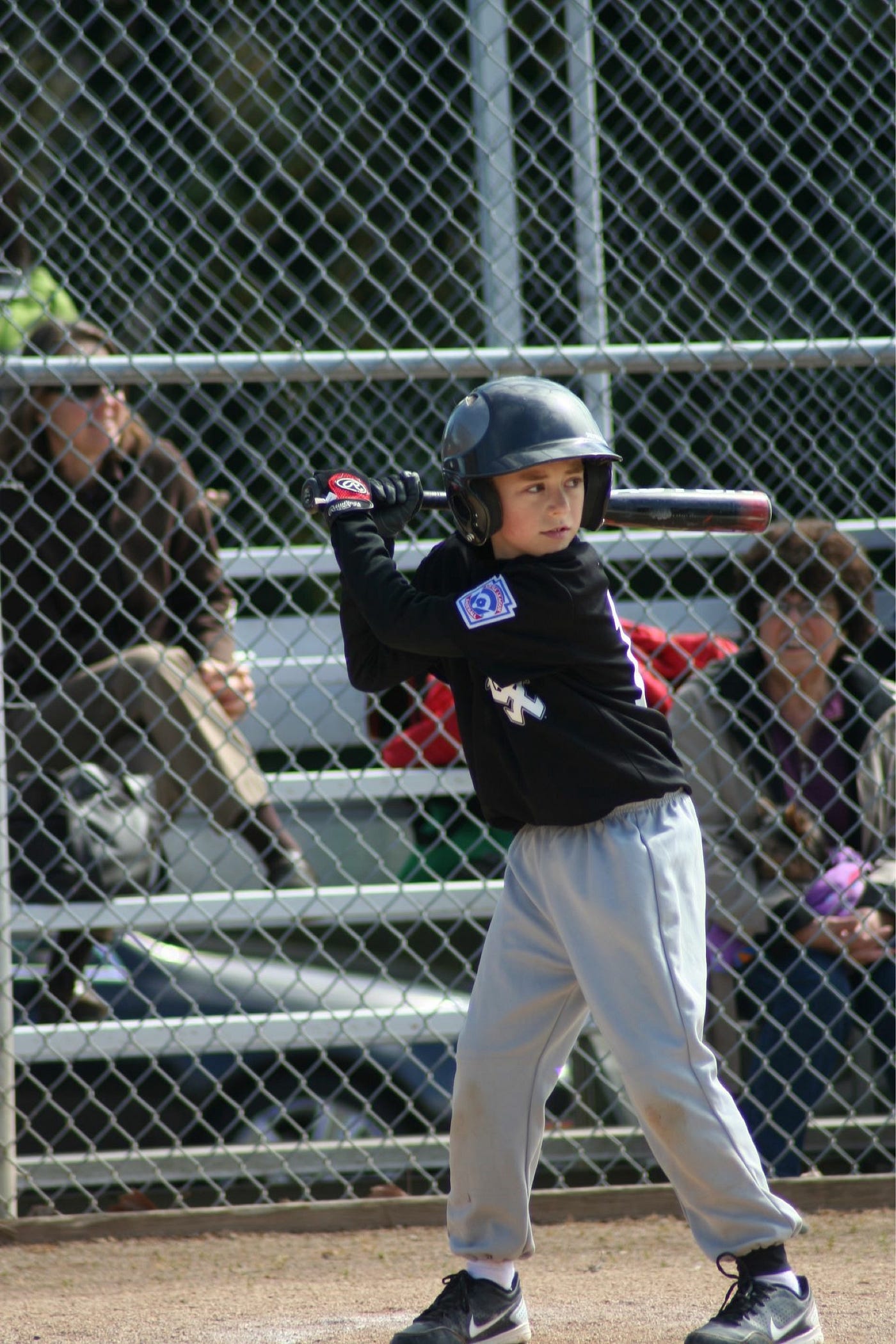
I played all-stars throughout Little League, and despite being a scrawny, undersized kid, I was pretty good. I remember when everyone was 11 or 12, they all started growing, but I didn’t. When you’re 12, you get the chance to go to the Little League World Series, and that year of all-stars coincided with my first time riding the bench in my life. I believe I’m one of only two players from that team to play four years of college ball, with the other being at Michigan.
The bench soon became a familiar sight. Once Little League was over, it was time to join the travel ball circuit. I began by playing for Baden Baseball in Seattle, which was interesting to say the least. I had a young coach, who I didn’t love at the time, but came to be one of my mentors within the coaching world when I somehow became his assistant coach ~8 years later. Dylan McLaughlin, I forgive you for putting me on the bench.
The following year, I left Baden to play for a new team called EnFuego. I think my mom was sick of me not playing and encouraged the switch. EnFuego was known for their college prep 18U team with lots of talent. My 14-year-old summer was the first time they had a 14u program. This was probably the best team I ever played on, we won 40-some games while losing less than 10. Our summer culminated in Miles City, Montana, winning the World Series of PNW 14u baseball. That team had a lot of people whom I would play with and face in High School, as well as one player who is now in the Marlins organization. The proof that winning doesn’t matter in youth sports comes to fruition here, as I absolutely hated every second of this team. The players were dicks, as most 14 year olds were. I still hadn’t grown and was still riding the bench. Baseball was still my favorite thing, but I started to give up on it at this point. On the bright side, this summer brought my two new family members. Our 18U team at EnFuego had players from across the country who needed host families, so two Hawaiian guys named Brandon and Worm lived in my basement all summer. These two became like big brothers to me, and they even came to my COLLEGE senior night about a month ago. That’s what baseball’s all about, man.
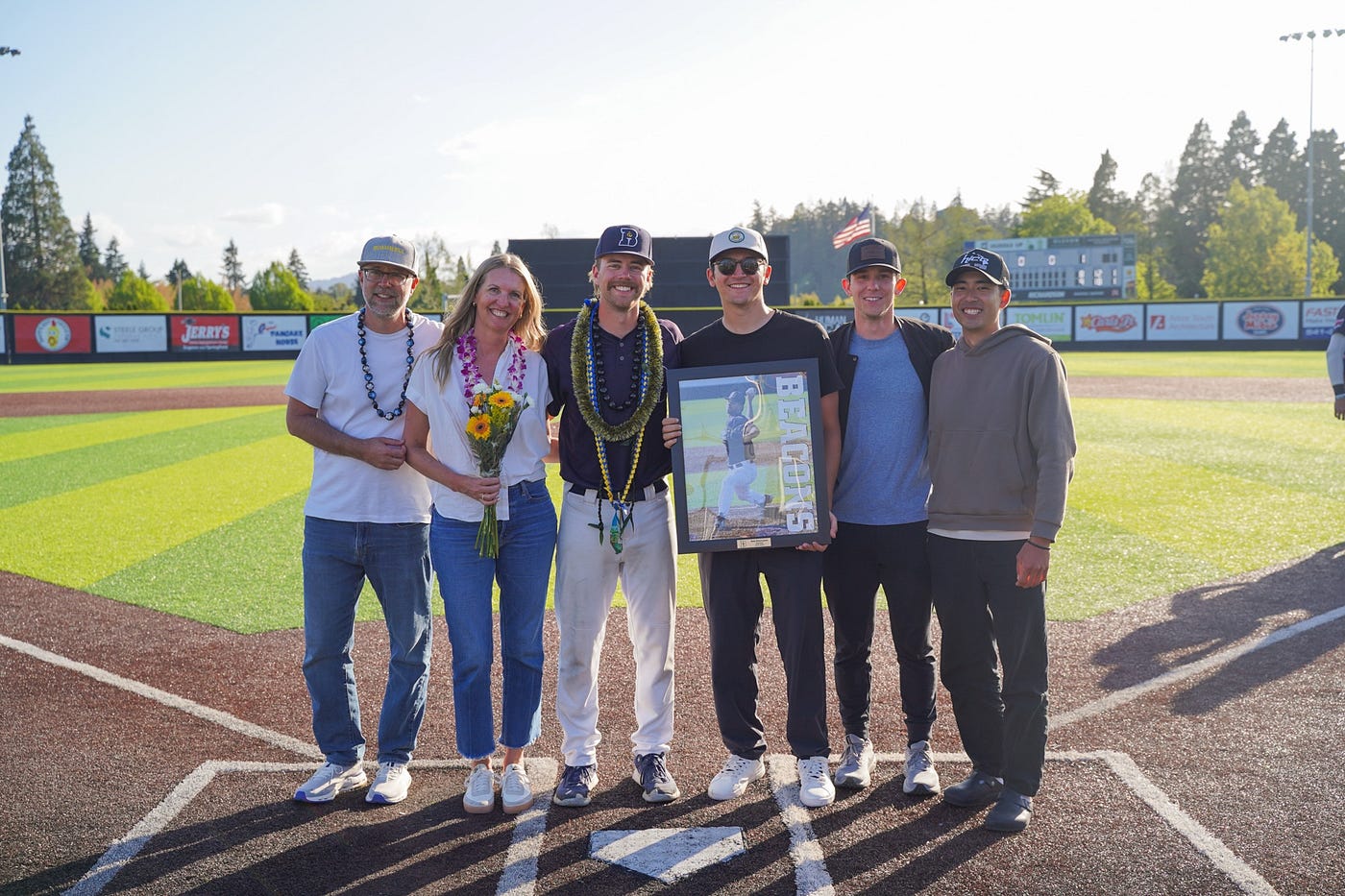
High School
And just like that, I was in High School, and just like that, I grew. Honestly, I’m not sure if I’ve grown since. I’ve been hovering around 6 feet ever since I was 15. This growth spurt accompanied some growth in baseball skills, thank God. I joined my third travel team in three years, never finding somewhere I felt like I fit in. This time, I joined City baseball, a place that I figured I would spend the rest of my High School career. Despite my newfound talents, I got put on the 15u ‘B-Team’, which rubbed me the wrong way.
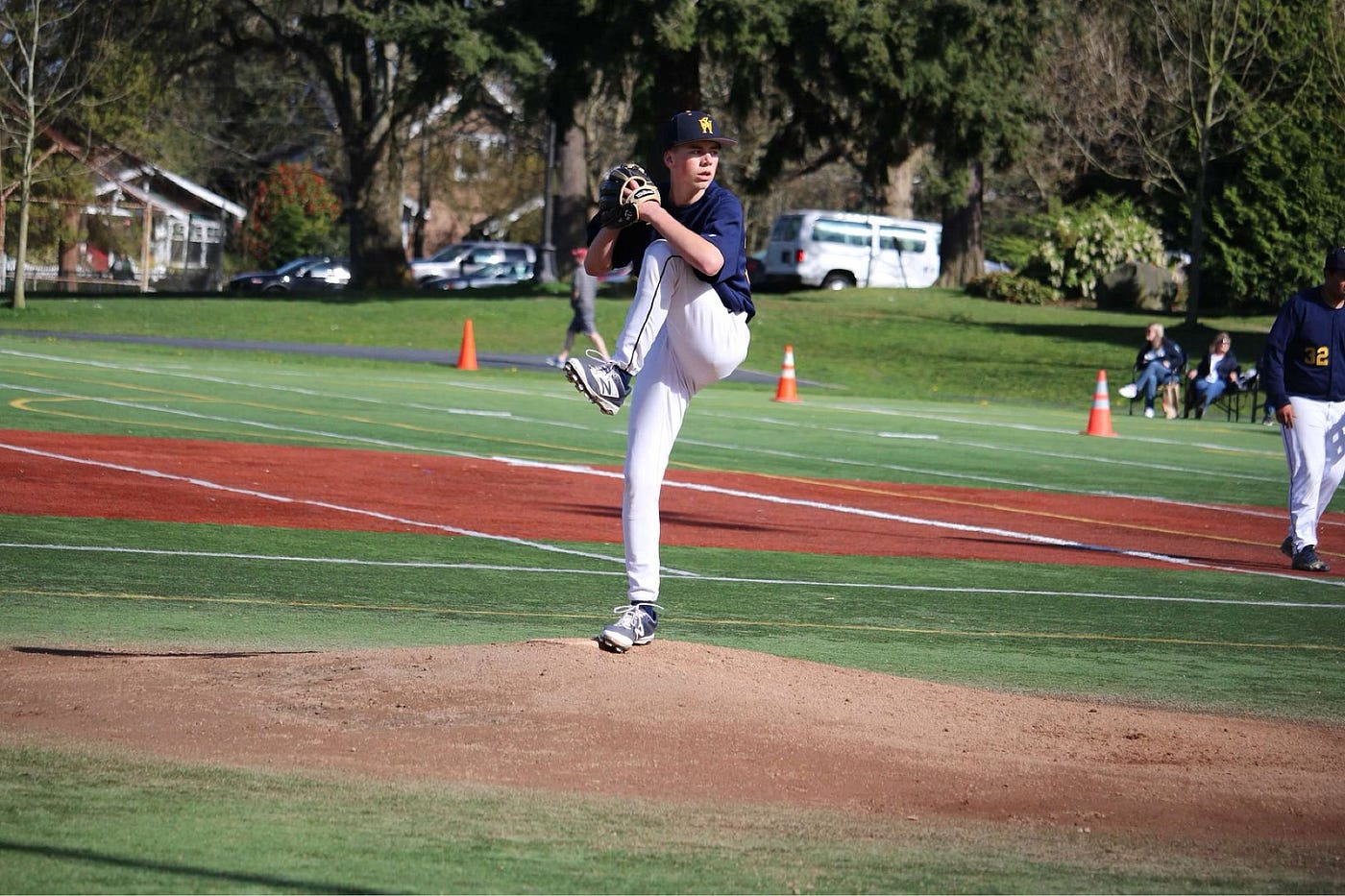
Once high school season came around, I thought I had an outside shot at making Varsity to start the season as a freshman, but I was placed on JV. My middle school bully got put on varsity as the only freshman. This was the first time I recall locking the fuck in and doing everything in my power to beat someone on the baseball team. I still think about this shit in the year 2025, because that’s all motivation baby. I don’t remember much outside of being really skinny, but really good during this time. I think by now my baseball IQ was starting to show and help my game. I spent every second growing up playing baseball video games on the Wii and watching SportsCenter. My family and I watched so much Mariners baseball despite them being so, so bad during this time. Toward the end of the year, I got the call to varsity as a freshman, and in my one at bat hit a double. I got pitched a handful of innings in the playoffs, too, something that propelled me into a great summer. I was absolutely dialed for this City ‘B-Team’. I had something like a 1 ERA in 70 summer innings, which would never be allowed in today’s pitch count age, but this was 2017, and we didn’t care. I was a real two-way player, finding real success on the mound for the first time in my life. I was still scrawny, but I was a ballplayer with newfound hopes to play college baseball.
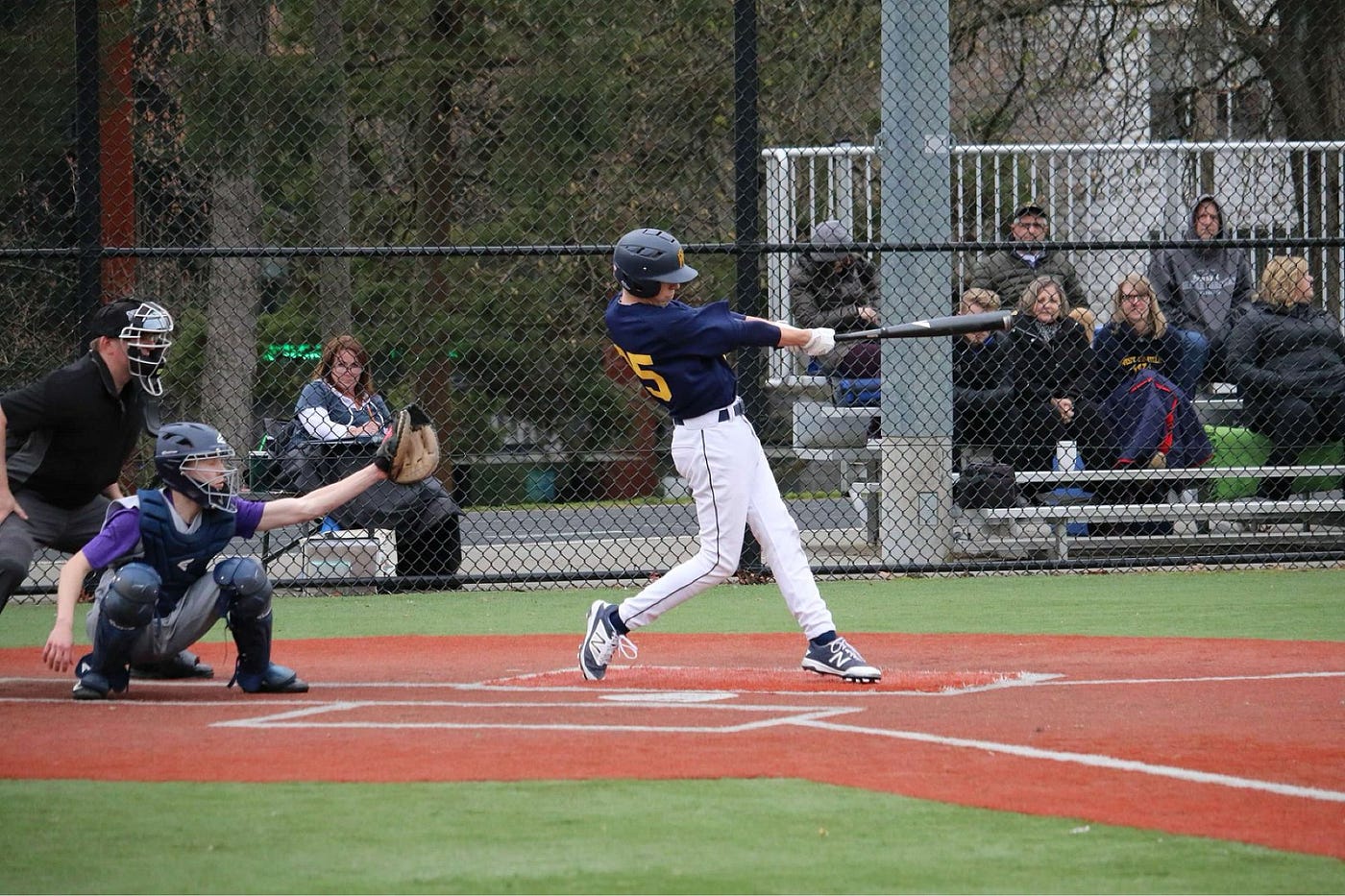
Sophomore year came around with a new opportunity. One of my favorite coaches from Little League reached out to my family, asking if I wanted to play for his summer team. It was an 18U team, where I’d be the youngest player, but one of the best. My coach, Rick, essentially sold out on turning me into a college prospect. I would lift with Rick and some teammates multiple times a week, and we did all kinds of training I’d never seen before. My high school season came around, and I became a Swiss Army knife on the field. I played almost every position on varsity that year, while becoming our #2 pitcher. I threw the most innings on the team, followed up by even more in the summer, while my future started to be seen as on the mound. I don’t remember much from that summer, but I think it was the biggest developmental year of my life. I owe a lot to Rick and his efforts this summer. The next year, the team would disband as most players went off to college, and I ended up being the only one to continue playing baseball.
Junior year came, and I rejoined City on their 18u team because they finally realized I wasn’t half bad. At the time, City was the spot to go for hopeful college players. Training began, and as we got into the winter, this little thing called COVID stopped everything. I had just been named the only junior captain at West Seattle, and the day before our first jamboree, we were told to go inside and stay there. My junior year was supposed to be the most important for my recruiting, and I had D1 dreams that were put to a halt. All of my hard work felt like it was for nothing, and I basically quit baseball. COVID fucked a lot of us up, but 17-year-olds did not have it easy during this time. There were limited opportunities to play baseball that summer as Seattle shut everything down, so I just stopped playing.
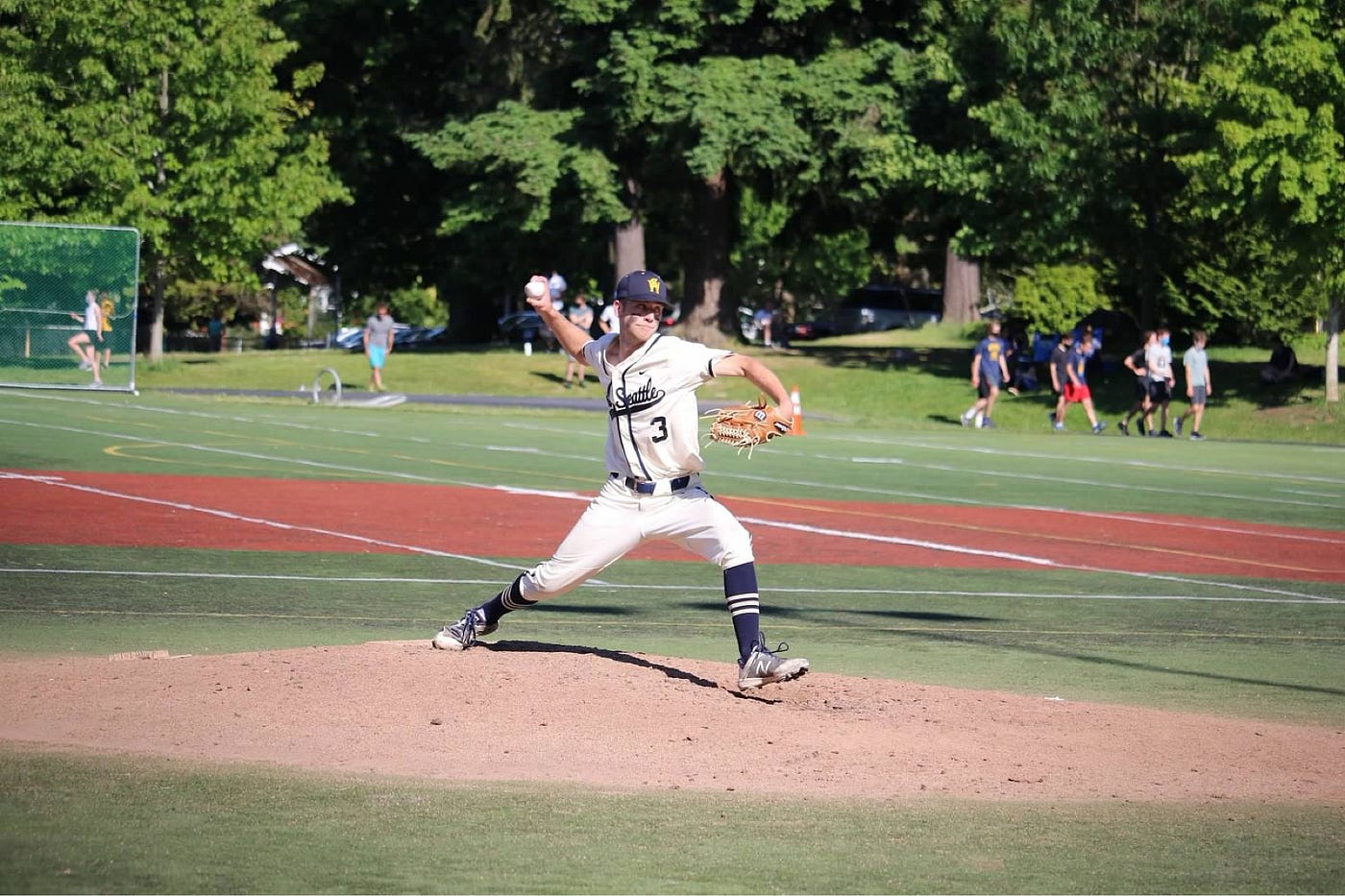
As the end of the summer came, I got ready to fire up my laptop for my senior year of high school. I got a message from Mark Yoshino at Bellevue College, who asked me why I wasn’t playing baseball. I had previously emailed Coach Yoshino in my sophomore year, which evidently became way too early to be recruited to a community college. He didn’t forget me, though, as a former 10-year-old MVP of the Bellevue College summer camps, Coach wanted to see me throw. I hadn’t picked up a baseball in months, but I got back to it as quickly as I could. We had some unofficial high school practices that fall, and Coach came to one of them to watch me throw a bullpen. It was a shitty bullpen. We talked a bit after I threw, and it was clear he wasn’t impressed. He said they’d be in touch, and I figured that was the end of my college baseball aspirations. I never threw hard, probably only up to the low-80s in high school, but I knew how to pitch. I lost all of that when I quit baseball earlier that year.
To my surprise, Coach Yoshino was interested, with a stipulation. It had become clear that my high school pitching coach, Tyler Haggett, as well as my new summer team owner, Mark Terao, had been begging Coach to pick me up at Bellevue. In Coach’s email to me, he said that I wasn’t good enough to play at Bellevue, but so many people vouched for my character that they would take me as a walk-on without a guaranteed spot on the team. Below is the email he wrote me, which I still read today
To be real, Coach said it was how it was. I wasn’t good enough to play, but I was given a chance at my dream school, which meant everything to me. I didn’t have to think at all and accepted the offer right away.
We ended up playing a short season for my senior year. It was probably a dozen games, and it was alright. There weren’t any playoffs, and I was ready to get to Bellevue. I met some amazing people through West Seattle baseball, many of whom are on their way to professional baseball now, but after COVID and everything else, I was ready to get to work.
Bellevue
I showed up at Bellevue 6’0, 150 lbs. That does not scream college physique to me. I got roomed with my soon-to-be best friend, Jacob Kaepernick, in the dorms, and we got to work. I spent that whole fall focusing on my body and lifting everything in sight. I was constantly living in fear that I would get cut because I wasn’t good enough, so I did everything I could to prove people wrong. I didn’t do anything but baseball that whole year. I spent every waking moment determined to achieve my goals, and that work ethic changed my life. I got up to 180 lbs and was benching more than two plates while squatting more than three, something nobody saw coming from the skinniest kid around. I never heard anything from Coach about getting cut, and I made the team with something left to prove.
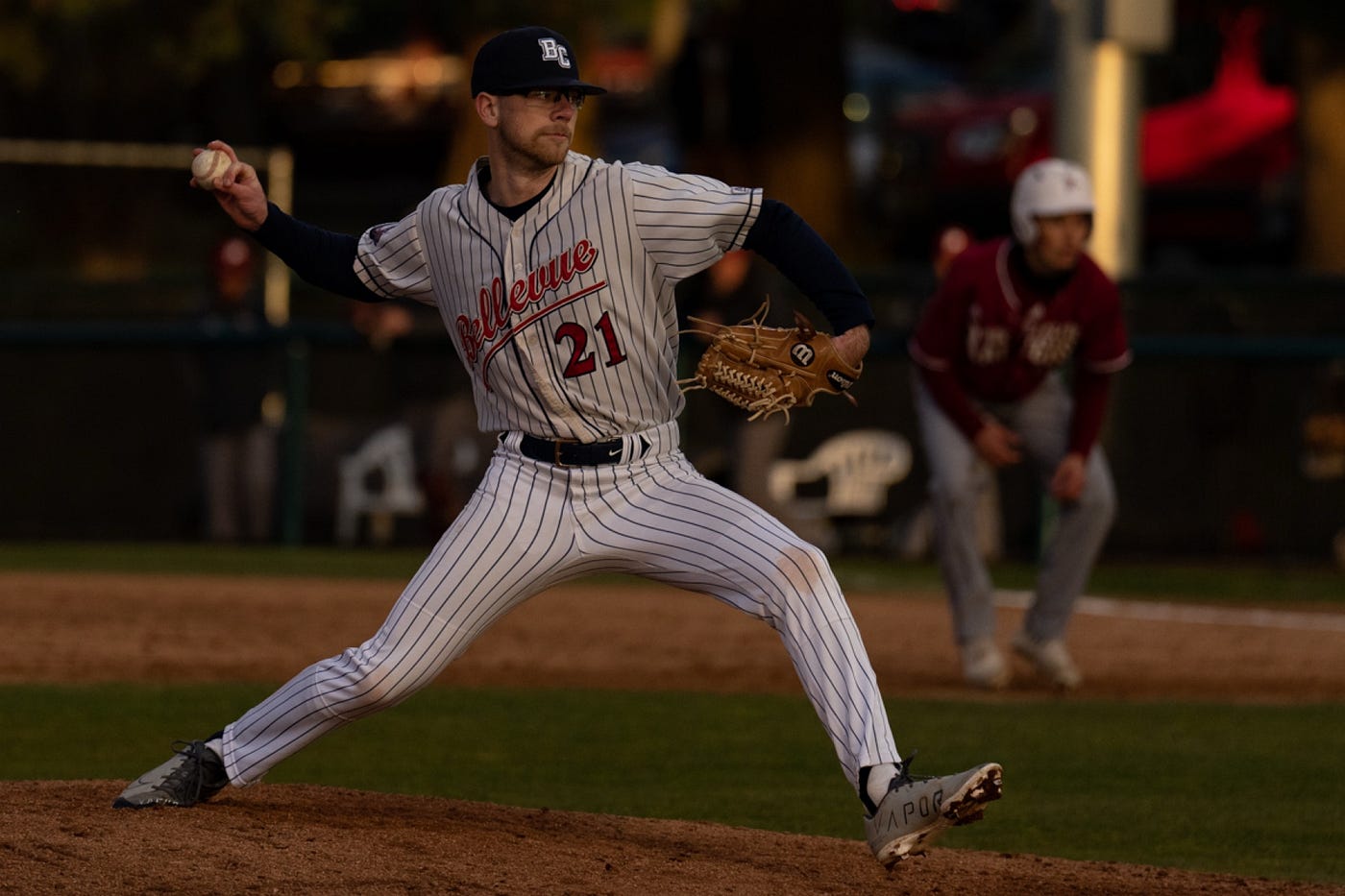
I ended up throwing every weekend for our team, which had a weird year and underperformed. We lost to Garrett Vohs and the Lane Titans in a regional, where I had my worst performance of the year. I walked 4 of my 8 batters all season in that game. I still use that game as motivation to this day, I never want to forget that feeling.
I had established myself as a college baseball player at this point. But I wanted so much more. My stats were my wallpaper, and I went into that summer hungry to become who I thought I could be. I ended up training that whole summer at a local baseball facility in Bellevue while doing groundskeeping at the baseball field. I spent most of that summer on my own, but I also got a girlfriend earlier in my freshman year, which was a new development. There’s a saying in baseball that guys who get new girlfriends end up sucking, and I found that out the hard way. I got complacent that summer and didn’t do what I needed to. I looked for shortcuts in my training, and that cost me a huge summer of development. We broke up that August (I’ve been damn single since), and I locked in. That fall was the prime of my playing career. I was throwing as hard as I ever had, no longer a soft-tossing crafty righty. I excelled that fall, pitching multiple scoreless innings against D1 SeattleU while positioning myself as a starter in our rotation that Spring. I went into winter break excited, but would ultimately get mono, which would change a lot of things in my life. I didn’t realize how bad mono could be, so I didn’t tell my coaches and went into January sick as hell. I never took any time off, but after a couple of bad performances to start the year, I told my coaches, which I should have done earlier. I didn’t even pitch during one week in my sophomore year, which was a huge reality check for me and my season. After the bad start, I felt like my future was crumbling in front of my eyes. I had lost about 20 pounds from mono and was back to throwing 80mph.
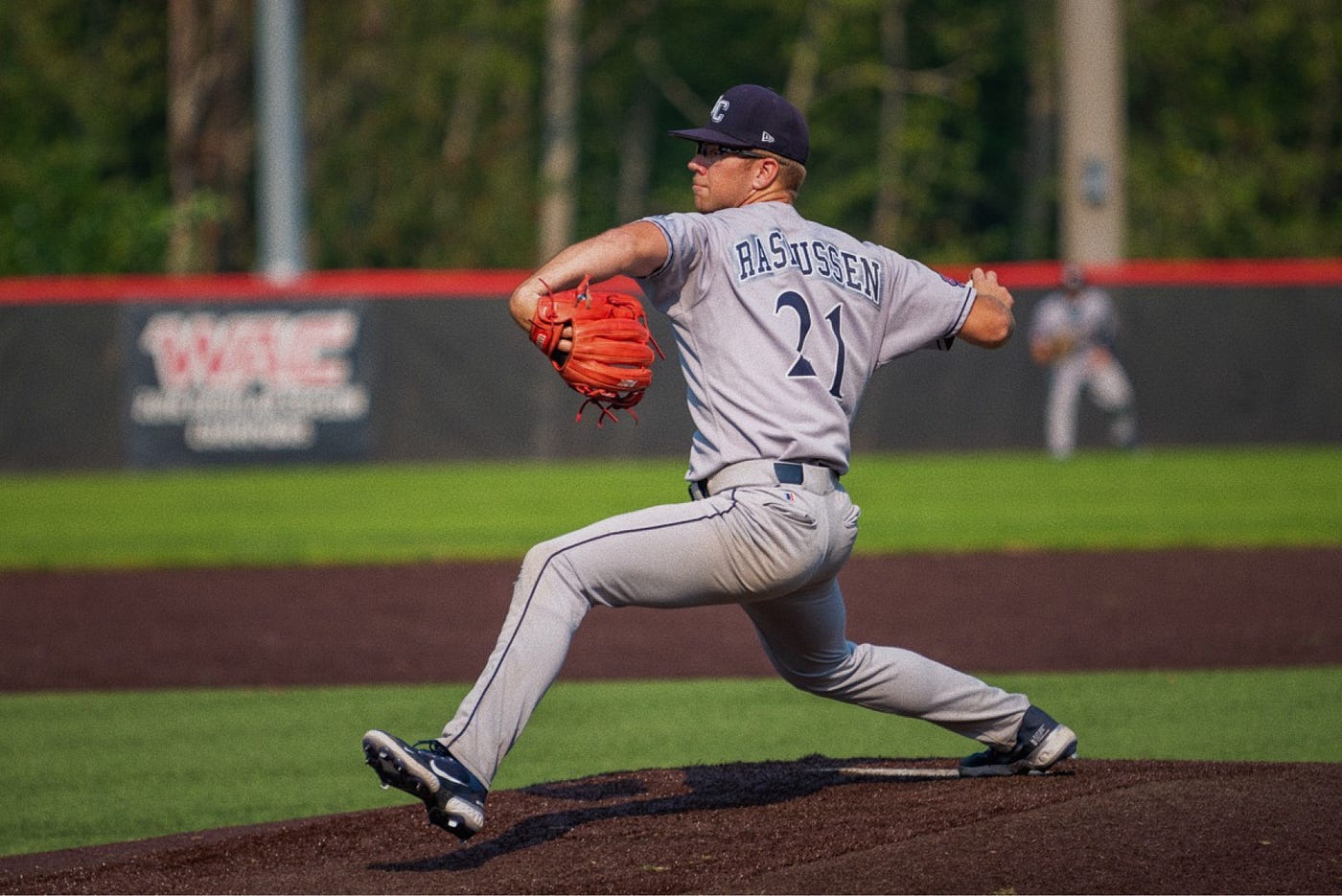
During this time, I began dealing with really bad anxiety. Something about being so sick and not telling anyone had messed with my head, and I had trouble leaving the house without having anxiety attacks. I simply couldn’t play on the road, as you can see by these numbers.
I found a way to become effective again down the stretch, and boy, was our team good. We had multiple All-Americans that year, and 5 eventual D1 pitchers. A couple of weeks before the playoffs, my coach told me that he had talked to a couple of schools about me and that they would start reaching out soon. At Bellevue, we didn’t handle our recruiting for 4 years. Coach Yoshino knew everyone and would place us somewhere he saw fit, which I never realized was the coolest thing ever. I got a couple of calls from some random schools in the middle of nowhere, and then a couple of preliminary ones from some good schools. I then got a text from some guy named Jamie Womack, from Bushnell, whom I had barely heard of. We set up a call, and I remember sitting in a parking garage in Bellevue, talking to Womack and being sold the dream. The weird thing was, everything he said ended up being true. Coach Yoshino encouraged me to skip practice the next week and go on a visit to Bushnell, which I came to find out was 5 hours away in Eugene, Oregon.
I made it to Eugene and was greeted by Tommy Richards, Tak, and Jamie Womack, three of the most influential people in my life today. They said it was how it was, saying that they were coming off a tough year, but it was only Bushnell’s second year as a program. They believed that year 3 would be the year things got good, and they wanted me to be a part of it. Jamie still makes fun of me to this day that I laid my cards down on the table too early. About halfway through the visit, I made it pretty clear I wanted to be a Beacon. This was the first time in my baseball career that it felt like a team wanted me, which influenced my decision a lot. Plenty of people in my life told me to wait until after the NWAC Championships to commit to a school, because I was just peaking at the end of my season. I signed with Bushnell the day after my visit, an incredibly fast and probably dumb idea that I have zero regrets about. We ended up getting 4th place in NWACs, and I left Bellevue as a better person on and off the field. My stats looked the same as my first year, which felt like an accomplishment given how much went wrong that year for me.
I owe a lot to my coaching staff at Bellevue for believing in me. David Olson and Cody Anderson were huge influences in my life, and they helped me become a man through hard lessons learned. Playing on one of the nicest natural fields in Washington also helped me learn how to take care of something that was bigger than myself. For some twisted reason, I miss picking weeds for hours at Bellevue with my guys.
That summer, heading into Bushnell, I played for the Bellingham Bells in the West Coast League. While there, I met so many guys who were incredibly talented at baseball, while also being some A+ humans. I was easily one of the worst players there, and dealt with an injury for the first time ever. My arm was simply dead, and my elbow was constantly hurting. I tried an arm-slot change, which utterly failed. Nice try, Cody. I left the Bells halfway through the season to rest my arm for the fall at Bushnell.
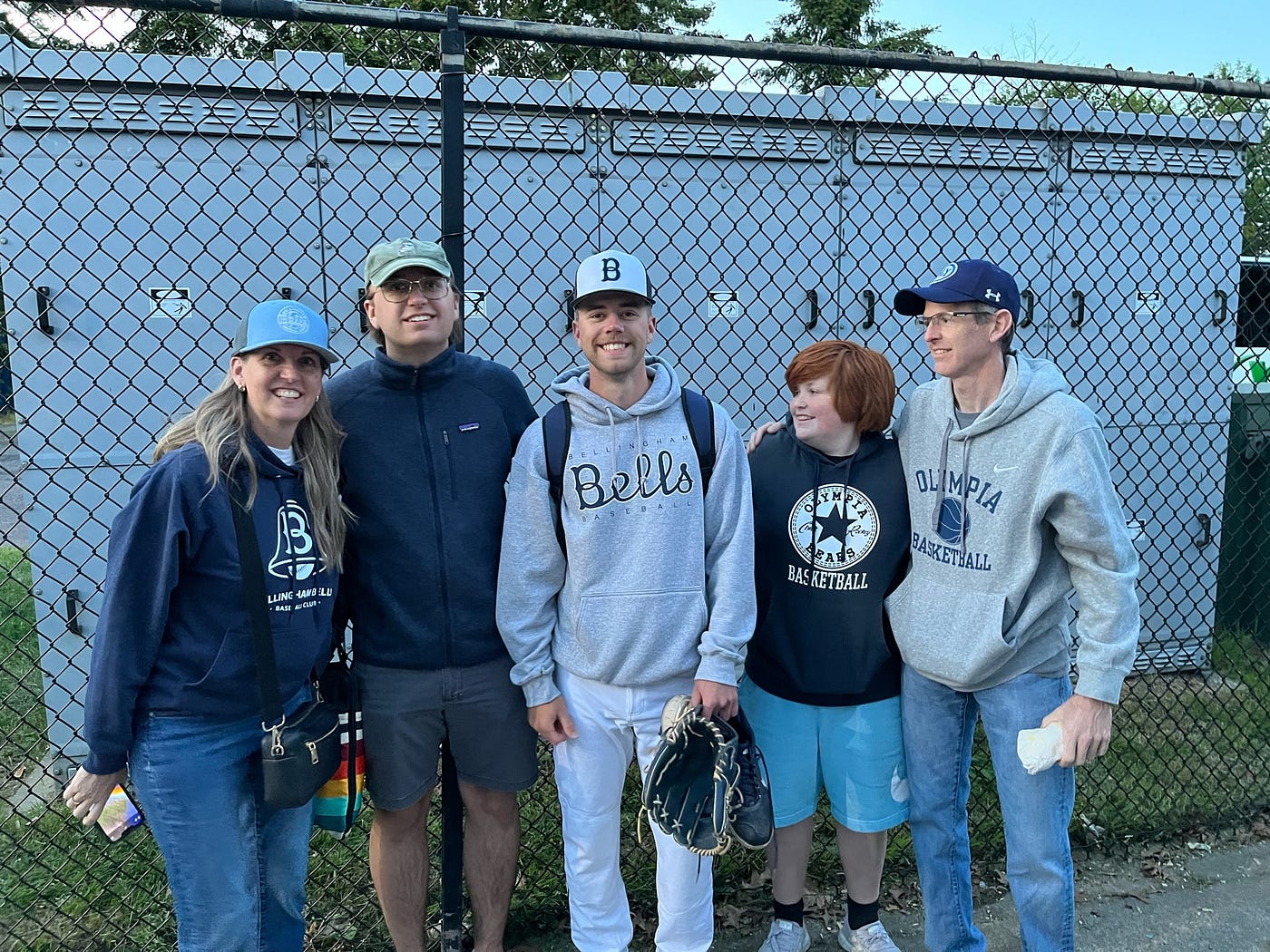
Bushnell
I showed up at Bushnell not knowing anyone on the team. This was the first time in my life that I was going into something completely blind. On my second day of practice in my junior year, I was practicing my daylight move to second base when I felt my elbow go. Before the coaches could see any of my talents, I was on the sidelines for the fall with a torn-up forearm. It’s hard to mesh with a team when you aren’t practicing with them, but I did my best and slowly met some of the best people in my life currently. I rehabbed in the winter and was all set to start the season for Bushnell, barely making it back in time. Nobody knew if I was any good because nobody had seen me throw, but alas, the season started, and I pitched in our first week down at Jessup in California. I got one inning in relief against the top 3 in the lineup, I came back out for a second inning, gave up a hit, and got pulled. I was not happy about this decision, and was slightly animated on the mound when Tommy came out to get me. I got my ass chewed out by our pitching coach Alan Embree, which was warranted. I would come to find out that they were trying to ease me back into competition, and gave me a really short leash because they knew nothing about me. Alan soon told me he was planning on moving me into the starting rotation for week 2, but decided against it after my little outburst.
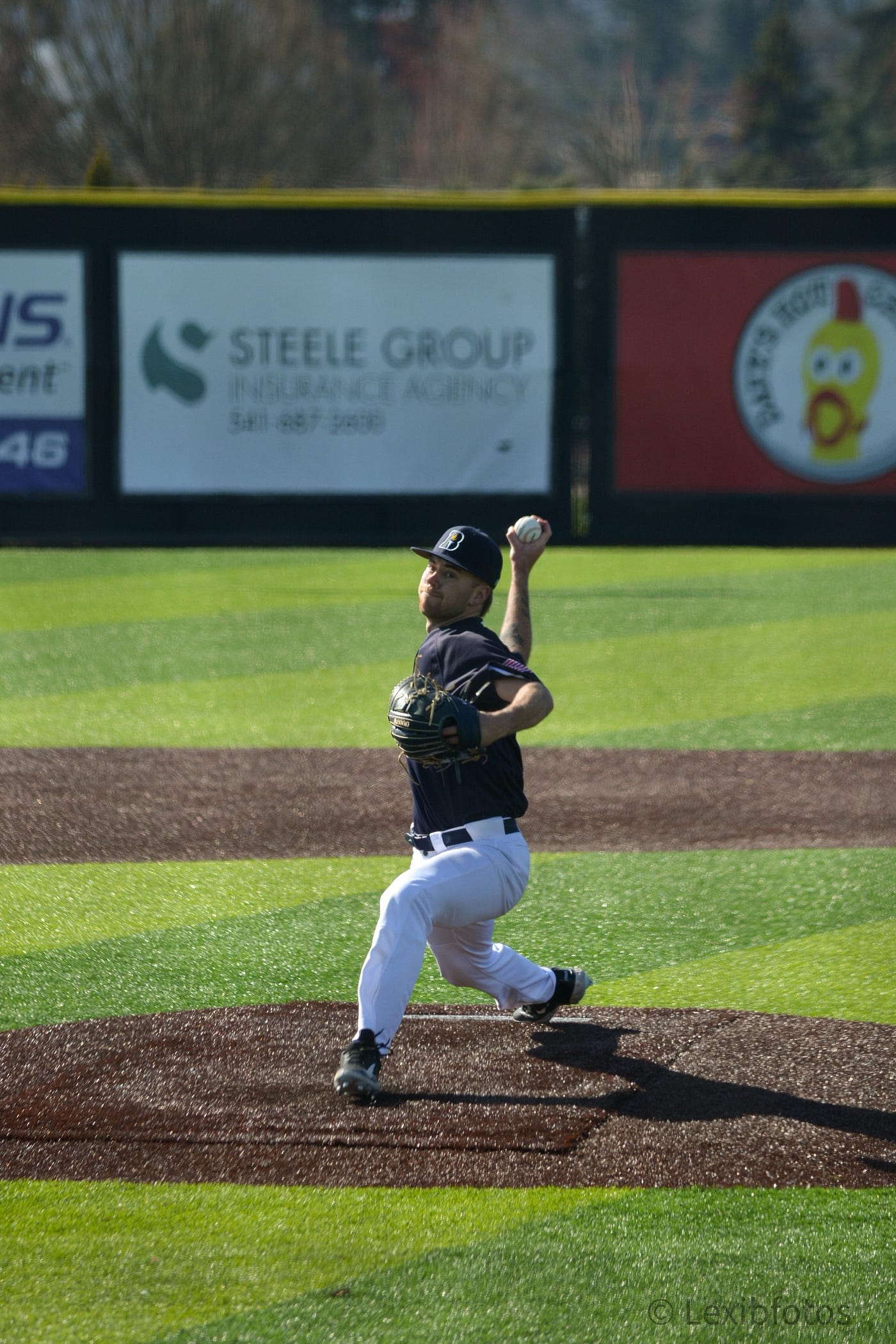
In week 2, I came out of the bullpen again, giving up a home run and battling for a couple of innings on the road at Simpson University. It was not up to my standard, but our pitching staff was struggling to start the year, so it could’ve been worse. To my surprise, in week 3, I was told I was going to start game 3. We were traveling up to my home state in Washington to face PLU and St. Martin's in a 3 game round robin. I got on the mound against St. Martin's, knowing I had a strict pitch count and would only get a couple of innings. I ended up turning in the best pitching performance of my life, going 5.2 innings without giving up a hit in 50 pitches. I begged to stay in the game, but knew I wouldn’t get the opportunity. We ended up winning the game, so all was well in my world. For the first time in a while, I had momentum on the mound. I carried that into week 4 against a Top 25 ranked team in the University of British Columbia, surrendering 1 run in 5 innings while building my pitch count up as a starter. I was finally doing my thing and starting for the first time since high school. I had an ERA in the 3’s, which was top 5 in the conference. I was top 5 nationally with a 0.7 WHIP, all while thinking things couldn’t get any better than this. Well, it turns out they couldn’t. During my bullpen preparation for week 5, I could barely throw a baseball. Every movement of my elbow was accompanied by sharp pain in my UCL region. I went to the trainers, who shut me down for the next couple of weeks until I could get an MRI on my elbow. I was once again on the sidelines, and after never dealing with injuries before, I had my second major injury in a year.
The MRI results came back as a frayed UCL, but no full tears. I also had a severe ulnar nerve problem. I hadn’t been able to feel my pinky and ring finger on my right hand for weeks, which was shown to be caused by a bunch of problems in my nerve tunnel in my elbow. I had an extra muscle in that area, a rare anatomical feature, which was pressing into my nerve alongside some other junk in there. Surgery was going to be the only solution for the nerve. Bushnell had remained right around .500 and in the heat of a playoff race in the CCC, so I elected to wait on surgery and returned to the mound. Every medical professional I talked to said my season was likely over and I should rest, but my coaches allowed me to pitch through the pain for the good of the team. I came back as a diminished version of myself, yet still effective enough to provide value. We had a real lack of starting pitching during this time, so I was thrust back into the starting rotation after a midweek rehab outing vs. Linfield. I returned to the rotation up in Canada against a UBC squad I had my way with earlier that year. It turns out that not being able to feel your hand while pitching hurts your command, as I was wild and was tagged for my worst outing of my college career, giving up 5 runs in 5 innings. In the grand scheme of things, this wasn’t a bad start in the NAIA, but I had lost a lot of confidence without having my usual pinpoint command. I bounced back the next week against Oregon Tech at home. Remember my home/road splits from Bellevue? The same trend continued at Bushnell. I was dominant at home and bad on the road. I went 5 innings against OIT, giving up one run before the game was halted by a rain delay. The delay lasted over an hour, and I consistently refused to be pulled by Tommy. It was an incredibly stupid thought, but I knew I was already injured and the team needed me. I was able to go one more inning before handing the game to our bullpen, earning my first win of the year. Yeah, I exited my no-hitter and earlier UBC game without the lead… Cmon JDub. My elbow was absolutely fried after OIT, and we had clinched a playoff berth, so we chose to rest me for our last regular season series at LC State, where we would get swept. We entered the playoffs as the 4 seed in a 4-team bracket, and I was chosen to start our first playoff game in school history. I’ve never won any awards or anything for baseball, so this nod was and is the greatest achievement in my personal baseball life.
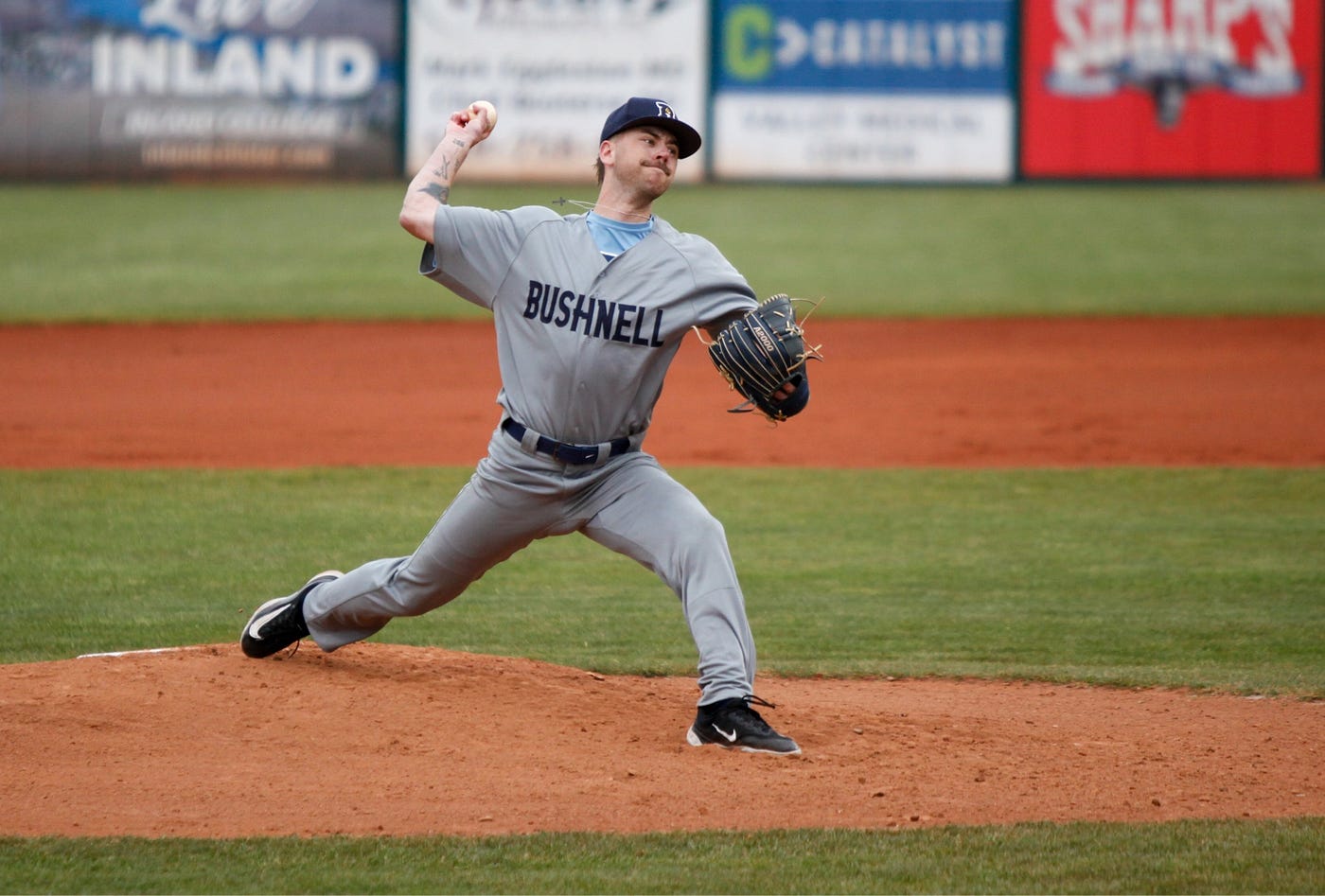
I got on the mound with no feeling in my arm and throwing about 75mph. It was a joke, but our team had a great sense of humor, and I wouldn’t have it any other way. I lasted for 4 innings, giving up 5 runs, but it didn’t matter. The Beacons had put up something like 8 runs in the first 4 innings, giving me a lead that Alec Gums would refuse to surrender, finishing the next 5 innings without giving up a run. The little Beacs from Bushnell, a third-year program, took down a top 10 team in the country in LC State. This was the first time in over 20 years that LC State had given up 20+ hits. We advanced and played UBC again, where Austin Wolfe would shut them down while the offense stayed hot, putting up double-digit runs again. We cruised to the championship, where LC State was waiting for us. The offense did their thing once again, and we comfortably won the CCC Championship. A third-year program winning a conference tournament is actually insane, especially in a conference with so many good teams. This was my peak baseball moment. I have never experienced the joy of baseball more than in this moment. It was one of the hardest years of my life, and it was all worth it for this moment.


We were sent to Atlanta, Georgia, for our regional, where we played at Georgia Gwinnett’s beautiful facility. We went two and out in the regional, and I did not pitch, as they were hoping to save me to start against Gwinnett. The Beacs had momentum and made a name for themselves in 2024, as my senior year was shaping up to be a really good one. I ended 2024 with a pretty average stat line for a starter on a playoff team. The NAIA is a ridiculous run environment.
I moved back to Seattle and attempted to set up a nerve surgery at UW Medicine. The process was horrible, and took way longer than it should have, but I finally got a surgery date set in August, which would set me up for a return date right around our start the following January. The surgery sucked, the recovery sucked, everything sucked. I had nearly no desire to keep playing baseball at this point, as the recovery sapped out most of my love for the game. I came back to Bushnell for the people I had grown to care about so much.
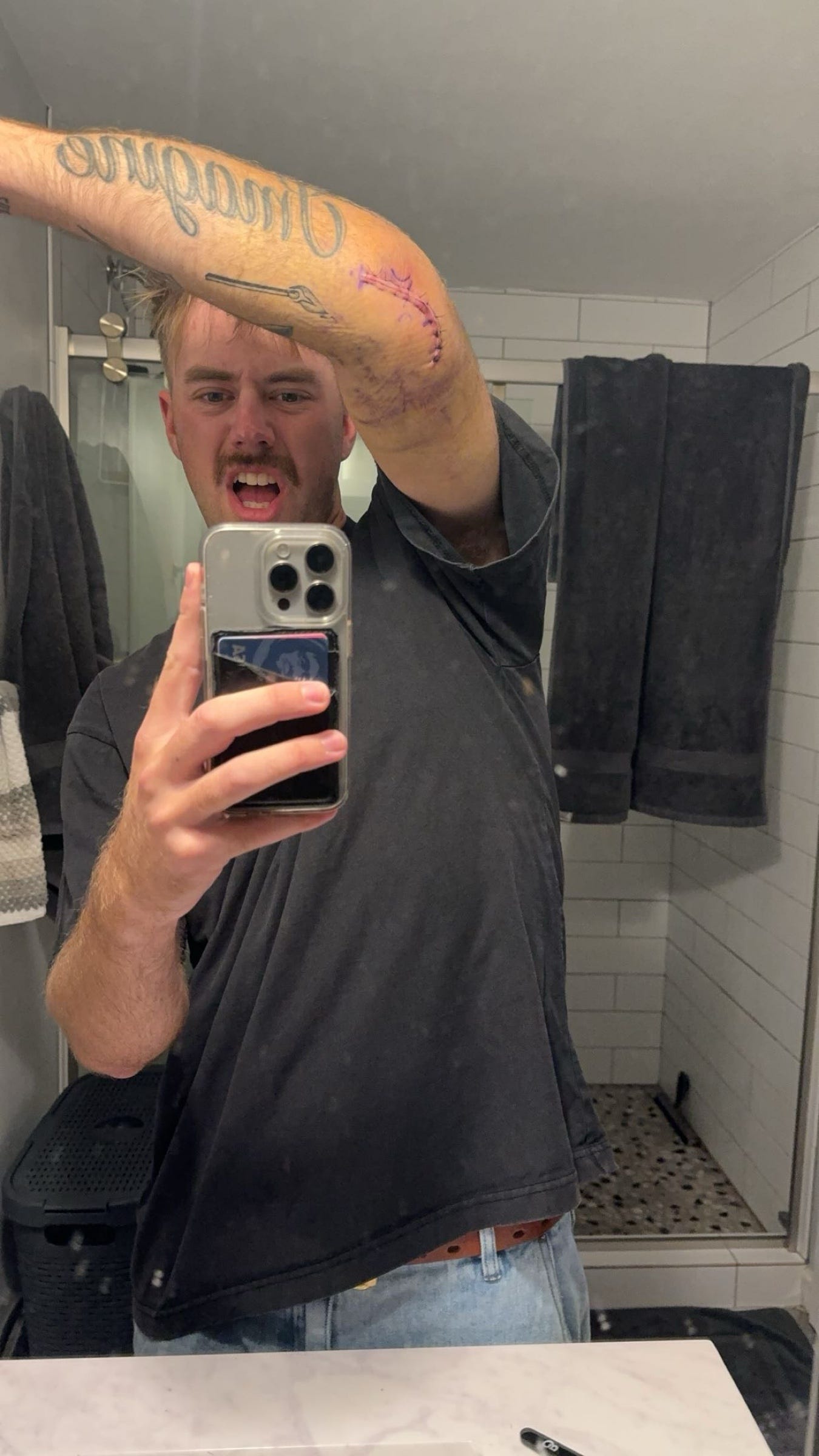
Jamie had taken over the head coach spot for Tommy, who left for WSU. I believed in what Jamie was building and sat on the sidelines for another fall, waiting to return. I started throwing again in November, and as I ramped up, something was wrong. My elbow was popping or snapping every time I threw, accompanied by strong nerve pain. My nerve had essentially dislocated from its groove, something the doctors at UW assured me would not happen. They neglected to look at my issue from an athlete’s perspective and opted for a simple solution for my first surgery. I went back to the doctor, this time in Eugene, who said that I needed another surgery to move my nerve, or I would have no chance of playing baseball again without pain. Two surgeries in less than six months. My senior year felt over before it started. When I sat down to schedule my next surgery, I heavily considered quitting baseball. I had gone through so much pain in the last year, and I wasn’t the same pitcher I was before all of the injuries. I’m not sure what changed my mind, but I booked the surgery and told myself that I was going to come back and start pitching as soon as I could throw a baseball in spite of all the doctor’s warnings. I got my surgery in mid-January, getting my surgical dressings off the same day that Bushnell opened their 2025 season. I did everything I could to tend to my elbow during this time. I hated ice, but I iced that sucker every single day. I tried every weird recovery method I could find on Reddit, and started lifting a 5-pound weight only 2 weeks after surgery, because I truly believed I could mind > body through this thing. Typical recovery for my surgery suggests immobilizing the elbow for 12 weeks before beginning to rehab things. Even the fastest recovery plans suggest starting weighted rehabs at 8 weeks. I began throwing a baseball 4 weeks after surgery, and returned to game action 6 weeks post-surgery. I returned after throwing one bullpen, determined to help a team that was already killing it. While I was out, Bushnell was winning every game in sight, with our first 20-game record landing at 17–3, a top 10 record mark nationally. Our pitching staff was top 15 in the country in every stat, leading the way for our team.
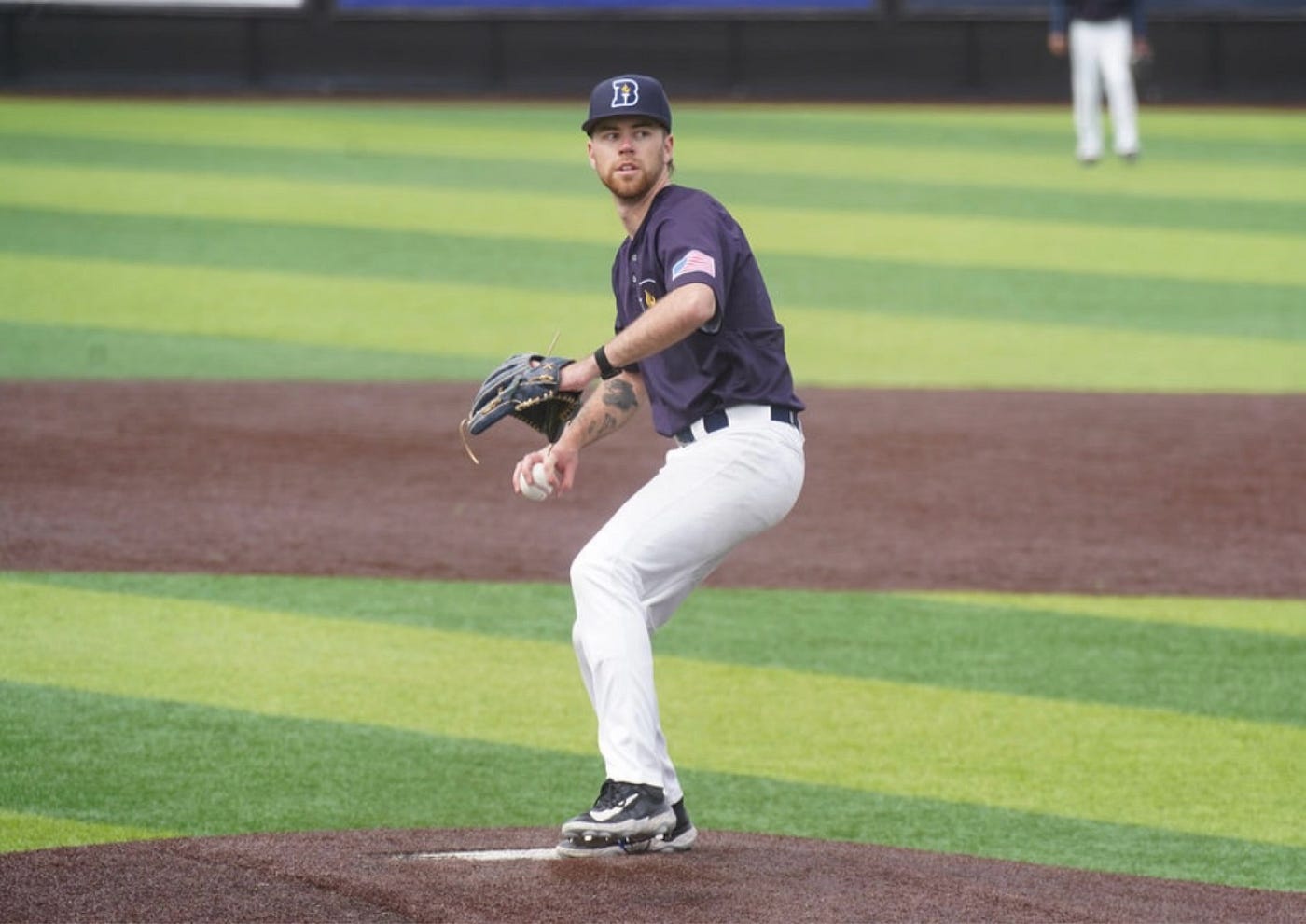
My first appearance came on March 11th. I didn’t give up my first earned run of the year until April 12th. I set the record for consecutive scoreless innings at Bushnell at 18 innings. I think this is the only team record I have ever held while playing baseball. I slowly came back in March, going 1 inning, then 2 innings, and then 5.2 innings out of nowhere. I matched up well against a new Warner Pacific team, coming out of the pen with 5.2 innings of one-hit baseball in 50 pitches. The following week, I would go 5 more innings out of the pen in under 50 pitches against Eastern Oregon. I was absolutely beating up on the bad teams in our conference while preparing myself for the good ones. I figured I would return to the starting rotation by now, showing that I was efficient, but I stayed in the pen for the whole year in a long-relief/leverage role. The team traveled to Corban, where we suffered our first setback of the year, splitting the series against a bad team. I got barreled up in this game for the first time all year, giving up no earned runs but struggling a bit. We went across the border the next week and got swept by UBC, where I would pitch on both Saturday and Sunday, giving up my first run of the year on Saturday. The following week, LC State came to us, where we split the series with them. I had my worst game of the year, giving up 4 runs in 2.1 innings on Friday, before coming in for the last out of the ninth inning in a tied game on Saturday. After going back-to-back days in the last two weeks, my body was really struggling. I didn’t have much ramp-up time coming back from surgery so quickly, and my shoulder was now the victim of my latest ailment. My labrum was cooked, but I chose not to go to the doctor and instead tried bandaging it with physical therapy. I would not allow myself to get shut down from baseball one week before the playoffs. We traveled to Oregon Tech the next weekend, where I had elected to take the weekend off from throwing. That changed quickly after we dropped a couple of games and were running out of pitching. I came in without much of a warmup, determined to stop the bleeding of a game we had just given up the lead in. I ended up giving up 2 more earned runs and getting pulled without finishing the inning. This would be my last college appearance ever.
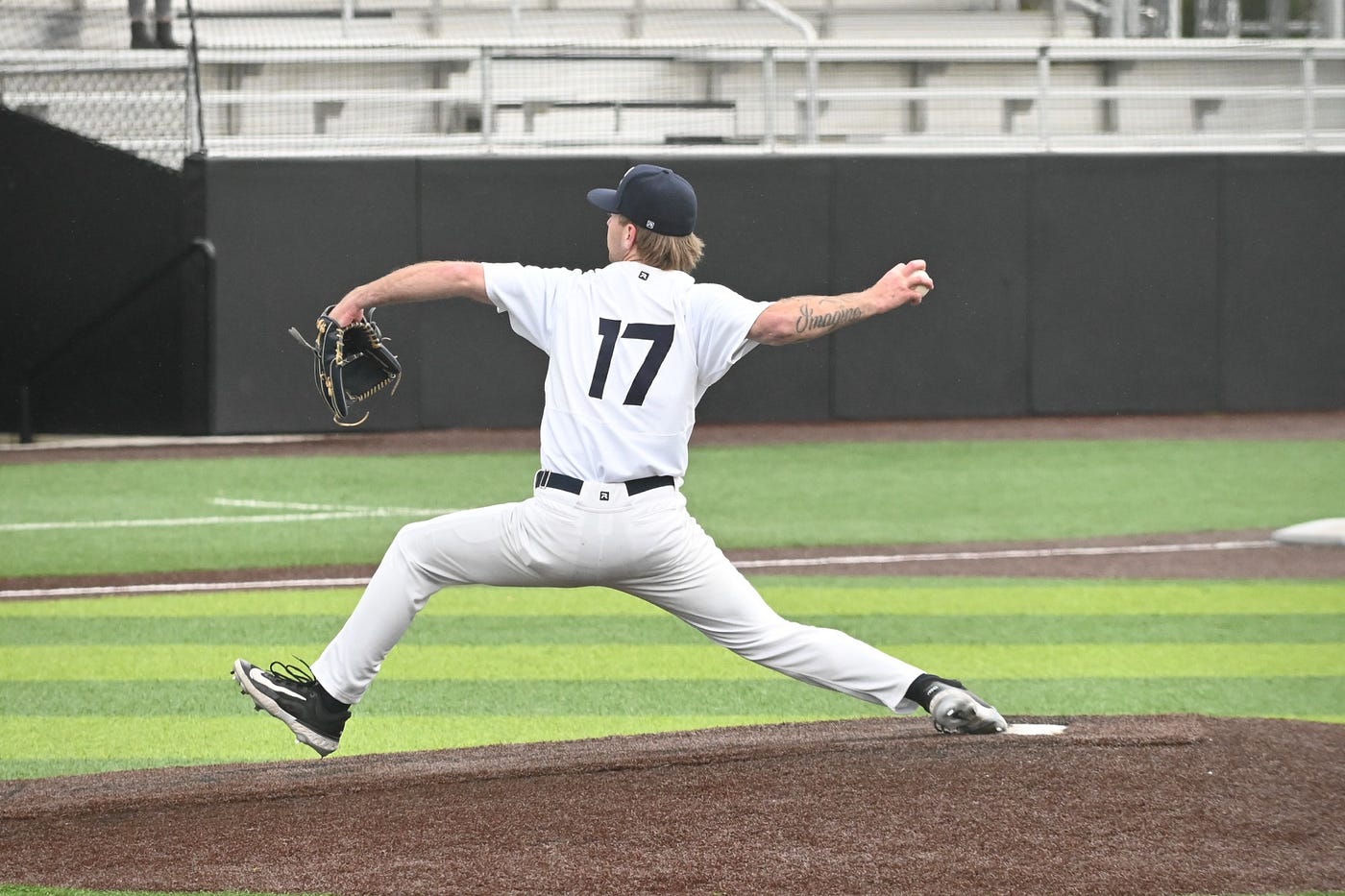
We went to the playoffs as the 4-seed once again, this time without our 2024 magic. We lost the first two games, and I didn’t pitch. I’m not sure if I’m ready to talk about this one yet, not being able to help our team in the playoffs has been hard to reckon with. After two surgeries and everything I’d done to come back for a team with World Series hopes, my college career was over in the blink of an eye. 20 seniors played their last baseball game that day. Through all of the struggles in the last two years, I put together the best season of my career, fueled by a relentless desire to keep going for the sport I loved so much.
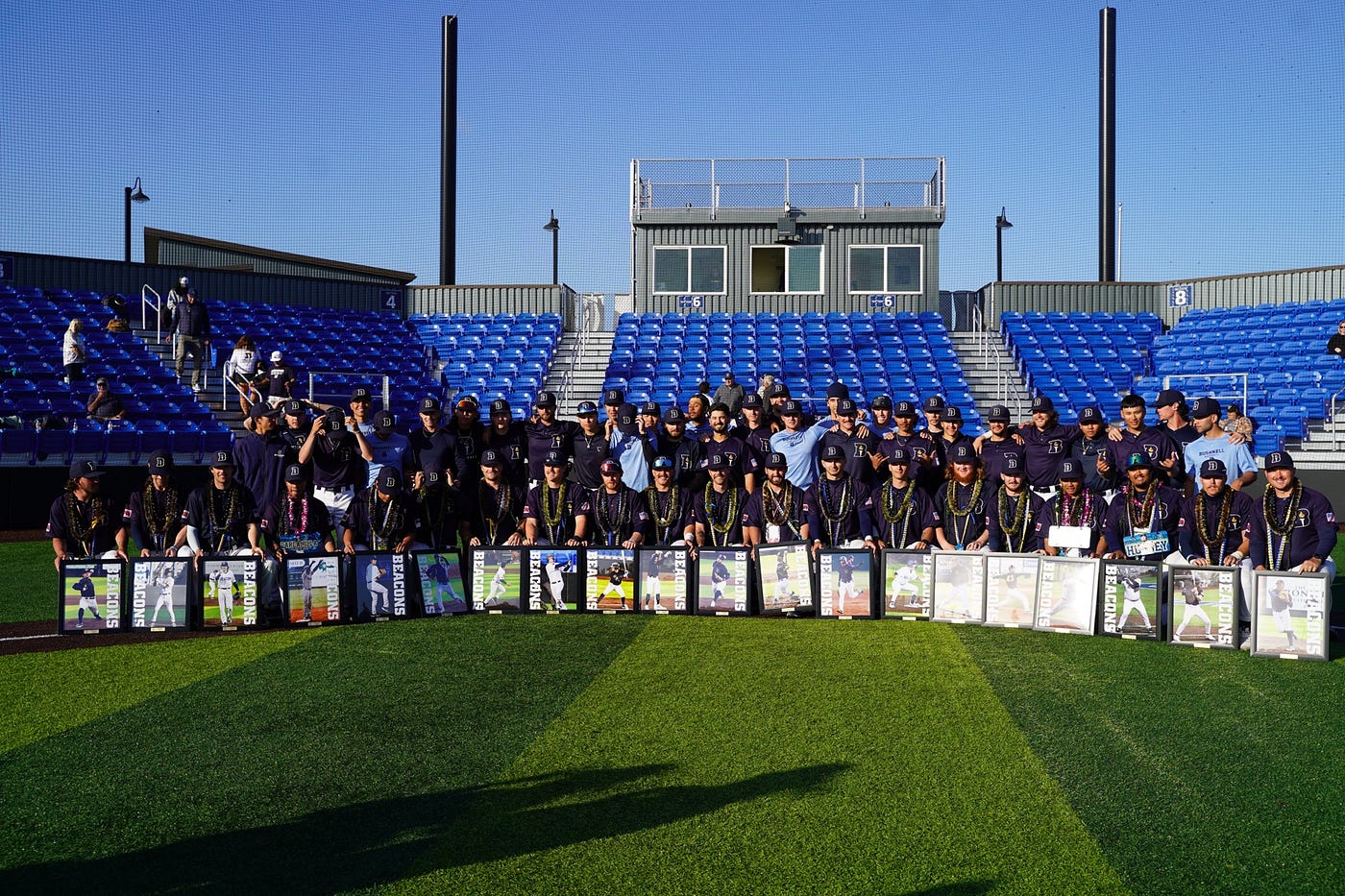
Conclusion
The reality of my situation is that I overperformed on the baseball field continuously, at least that’s what my coaches told me in my exit meeting at Bushnell, which is honestly one of the best compliments someone can get. I never threw harder than 83mph at Bushnell, something that does not scream success like I had. I was able to command 5 pitches in the zone for all of my college career, while doing everything I could to throw hitters off. I refused to walk batters for the majority of my college career, keeping traffic on the bases low. One of my proudest statistics is that I never had an error in a college game. All of my time practicing PFPs and getting good at the ‘non-throwing’ part of baseball had paid dividends. In my senior year, I also did not allow a stolen base, proving that despite low velocity, if you care about your runner holds, they can’t do anything on the basepaths. Doing the little things perfectly gave me enough wiggle room to have bad stuff on the mound and still succeed. I wasn’t supposed to be here, I wasn’t supposed to play college baseball, but I did and had a damn good 4-year career.
I also got my senior year eligibility back because I didn’t appear in enough games, so if anyone wants to let me play shortstop, hit me up. I think my arm is done with pitching.
For every college game I had something written in my hat, just two words: “Fuck you”. I think that’s a good summary of what I brought to the field every day. I had an endless desire to beat the opposing team despite being one of the least talented guys out there. A fuck you mindset with the work ethic to back it up will take you a long way in this game.
Over the past 5 months, I’ve begun work at Prospects Live, dipping my toes into the scouting world of baseball with the same work ethic I brought to playing the game. I’ve never been happier than while working at PL, and I think it will be a great jump start into a future career. For the past couple of years, I have realized my desire to remain in baseball for the rest of my life. My daily ‘to-do’ list has one bullet point at the top of it every day for years: “Be the youngest GM in MLB history”. It’s an absolutely insane goal, and I have 6 years to make it happen, but college baseball once felt impossible before someone took a chance on me, hopefully, an organization will do the same for my professional career. I can’t wait to see what’s next in my baseball journey, and I appreciate so much everybody who was a part of this journey. A new update is that I will be returning to Bushnell as an Assistant Coach, helping with a variety of roles. I owe my parents so much for all the long days of baseball they had to put up with over the years, and for funding this journey.
Thanks for reading.
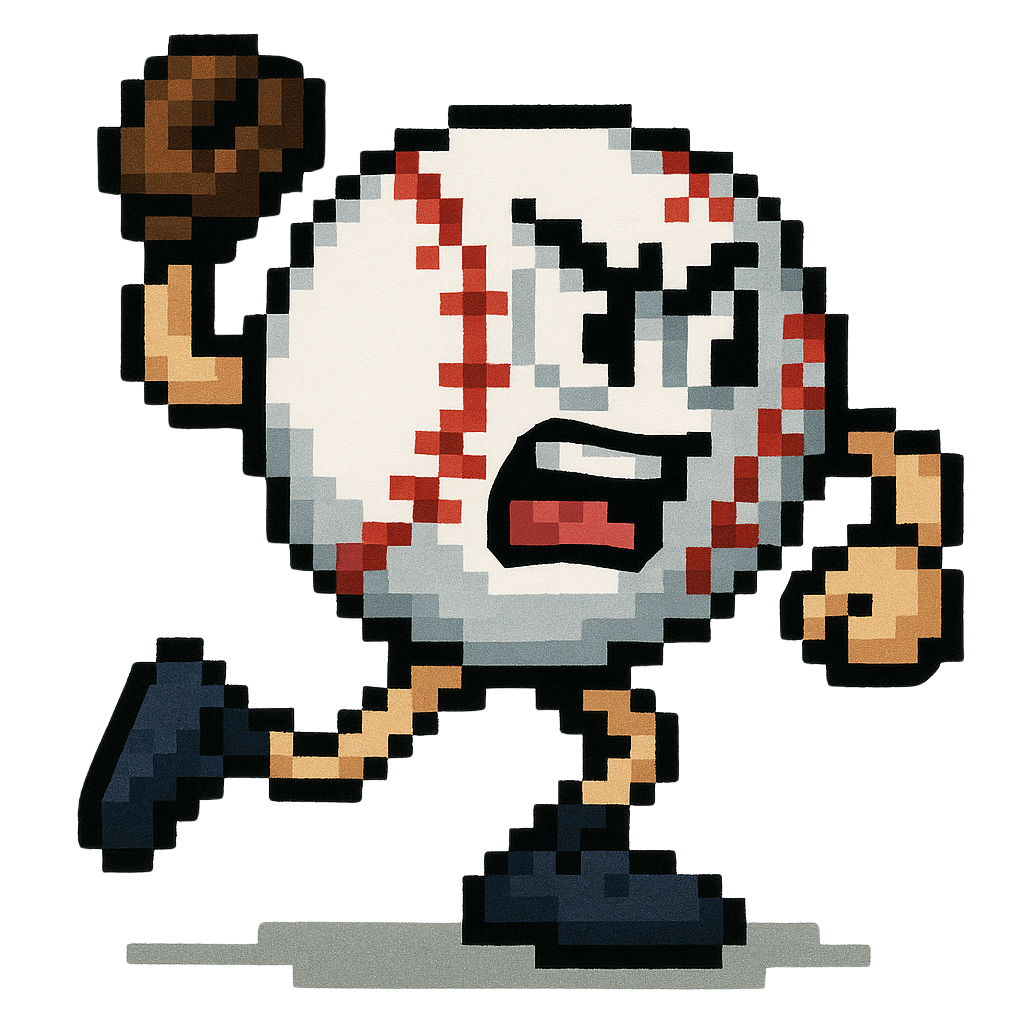
Comments ()